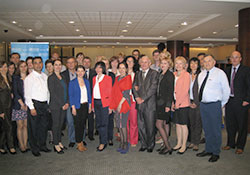Multicountry training in Slovakia: integrating equity into maternal and child health programmes focusing on the Roma population

WHO
Public health experts and researchers, and representatives of health ministries and civil society organizations including Roma association representatives from Albania, Romania, Slovakia, Ukraine and observers from the United Nations Administered Province in Kosovo gathered in Bratislava, Slovakia on 25–28 May 2015. They participated in training on how to build country capacities for integrating equity into strategies, programmes and activities related to maternal and child health (Millennium Development Goals 4 and 5). The training had an explicit but not exclusive focus on the Roma population. In preparation for this training, a train-the-trainer pilot session was held on 19–20 March 2015 in Skopje, the former Yugoslav Republic of Macedonia, followed by in-country meetings of national teams in April and May 2015.
Improving the health of socially excluded communities
Dr Piroska Östlin, Programme Manager, Vulnerability and Health at WHO/Europe, said, "Achieving health equity is not possible without improving the living conditions of social groups that are experiencing poverty and social exclusion. The conditions in which most Roma live seriously affect their health as do persistent inequities between Roma and majority populations, including access to health care."
The training was opened by Dr Darina Sedlakova, Head of the hosting WHO Country Office in Slovakia, who informed that Slovakia ranks among countries with the highest proportion of Roma population (around 8%). Evidence shows that Roma women are less likely to have access to preventive reproductive and sexual health information and care. They have on average 3 times more pregnancies than non-Roma; a large number of Roma girls give birth to their first child before the age of 18. Mr Peter Bak, Director, Department of European Union Affairs and International Relations of the Slovak Ministry of Health, highlighted the strong dedication of the Government to improve health and living conditions of Roma people in Slovakia and thanked WHO for providing systematic and long-term support in this area to Member States.
Participants learned how to use a methodological tool developed in Spain for effective integration of equity into health strategies, programmes or activities (SPAs). WHO adapted the tool to focus on child and maternal health, human rights, gender and social determinants of health. The multistakeholder composition of the national teams allowed the selected SPAs to be tailored to best meet the needs of vulnerable groups and address health inequity.
Interagency coordination initiative to advance child and maternal health
This training is linked to WHO's global work, which pilots a methodology for reviewing how national health programmes can better address equity, social determinants, gender and human rights. This work is supported by the Government of Norway, within the framework of an interagency coordination initiative called "Scaling up action towards Millennium Development Goals 4 and 5 in the context of the Decade of Roma Inclusion and in support of National Roma Integration Strategies". WHO facilitates this initiative, which involves the United Nations Population Fund (UNFPA), the Office of the High Commissioner for Human Rights (OHCHR), the United Nations Development Programme (UNDP), the United Nations Children's Fund (UNICEF) and the International Organization for Migration (IOM).



